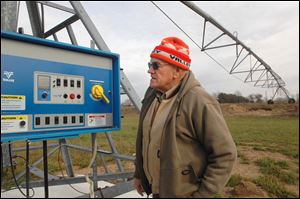
Dry summer turns up demand for irrigation systems in Indiana
12/8/2012
Chuck Phillips, co-owner of Phillips & Son Irrigation Services in Bristol, Ind., shows a control panel at a pivot point on a three-span irrigation system. The company is busy installing and expanding the equipment throughout the region. Business has doubled this year, Mr. Phillips said.
NEW PARIS, Ind. — After the recent parched summer, the Mathews family decided to upgrade some of its irrigation equipment on farmland south of New Paris, and they are not alone.
The family switched two labor-intensive towed sprinkler systems to pivot sprinklers, which take much less effort.
“It's much easier to move,” said Jeff Mathews, whose family has been farming in the area more than a century. This year saw one of the worst droughts in family history. Fortunately for the Matthews family, roughly three quarters of its ground is irrigated.
“This year was a good year to have watered. That takes a little pressure off,” Mr. Mathews told the Elkhart Truth.
In fact, irrigation allowed the family to double the state average of 100 bushels of corn per acre, and it got about 60 bushels of soybeans per acre, nearly one-and-a-half times the state's average.
When the Mathews family wanted to add pivot systems this year, it turned to their usual company, Phillips and Son in Bristol, Ind. But “they're popular this fall,” Mr. Mathews said.
“This year in whole, we're probably twice as busy,” co-owner Charles Phillips said, and they cannot get to customers in a decent time. “I've had three calls wanting estimates on irrigation this morning. Probably had a couple yesterday. That's just the way it's going,” he said. Development costs vary based on a lot of factors, but run from $950 to $2,300 per acre, Mr. Phillips said.
Jeff Burbrink of the Purdue Cooperative Extension Service in Elkhart County said, “Part of the issue this year is the drought. People saw what irrigation did. If you had an irrigation system this year, you probably paid for it in one year. The difference between zero and 200 bushels is huge. By having irrigation it kind of guarantees you a crop and is kind of an insurance policy for all the money you spend.”
Livestock growers who pasture their animals also added irrigation this year.